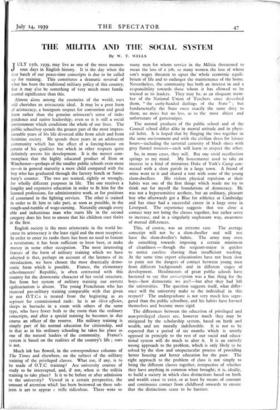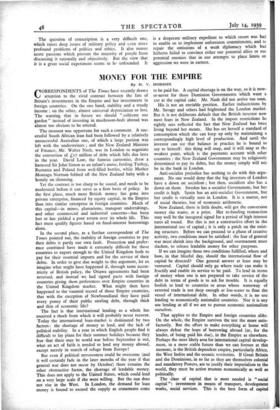THE MILITIA AND THE SOCIAL SYSTEM
By W. T. WELLS
JULY i5th, 1939, may live as one of the most momen- tous days in English history. It is the day when the first batch of our peace-time conscripts is due to be called up for training. This constitutes a dramatic reversal of what has been the traditional military policy of this country. But it may also be something of very much more funda- mental significance than this.
Almost alone among the countries of the world, ours still cherishes an aristocratic ideal. It may be a poor form of aristocracy, a bourgeois respect for convention and good form rather than the genuine aristocrat's sense of inde- pendence and native leadership; even so it is still a social environment which conditions the whole of our lives. The public schoolboy spends the greater part of the most impres- sionable years of his life divorced alike from adult and from feminine society. He spends these years in an adolescent community which has the effect of a forcing-house on certain of his qualities but which in other respects quite definitely arrests his development. It is the merest com- monplace that the highly educated product of Eton or Winchester—perhaps of the smaller public schools even more so—is in general maturity a mere child compared with the boy who has graduated through the factory bench or Sains- bury's counter. The two are trained, rightly or wrongly, for wholly different purposes in life. The one receives a lengthy and expensive education in order to fit him for the learned professions, for administrative work, or for positions of command in the fighting services. The other is trained in order to fit him to take part, as soon as possible, in the rough-and-tumble of wage-earning. Naturally enough every able and industrious man who starts life in the second category does his best to ensure that his children start theirs in the first.
English society is the most aristocratic in the world be- cause its aristocracy is the least rigid and the most receptive. In order to enter its ranks there has been no need to foment a revolution; it has been sufficient to brew beer, or make money in some other occupation. The most interesting feature of the form of military training which we have adopted is that, perhaps on account of the lateness of its introduction, we have chosen the most drastically demo- cratic form which is possible. France, the elementary schoolmasters' Republic, is often contrasted with this country for the democratic character of her social structure. But from her system of military training our austere egalitarianism is absent. The young Frenchman who has received pre-military training comparable with that given in our O.T.C.s is treated from the beginning as an aspirant for commissioned rank : he is an olive officier, sleeps in barracks in a room with others of the same type, who have fewer beds to the room than the ordinary conscripts, and after a special training he becomes in due course an officer of the reserve. His military training is simply part of his normal education for citizenship, and in that as in his ordinary schooling he takes his place as one of the natural leaders of the community. France's system is based on the realities of the country's life ; ours is not.
Much ink has flowed, in the correspondence columns of The Times and elsewhere, on the subject of the military training of the privileged classes. What use, if any, is to be made of O.T.C. training? Are university courses of study to be interrupted, and, if not, when is the militia training to take place? Is it to be before or after admission to the university? Viewed in a certain perspective, the amount of attention which has been bestowed on these sub- jects is apt to appear r trifle ridiculous. There were so many men for whom service in the Militia threatened to mean the loss of a job, so many women the loss of whose son's wages threaten to upset the whole economic equili- brium of life and to endanger the maintenance of the home. Nevertheless, the community has both an interest in and a responsibility towards those 'whom it has allowed to be trained as its leaders. They may be, as an eloquent mem- ber of the National Union of Teachers once described them, " the curly-headed darlings of the State " ; but fundamentally the State owes exactly the same duty to them, no more but no less, as to the most abject and unfortunate of guttersnipes.
The normal products of the public school and of the Council school differ alike in mental attitude and in physi- cal habit. It is hoped that by flinging the two together in the same environment and with the civilian dress for leisure hours—including the sartorial curiosity of black shoes with grey flannel trousers—each will learn to respect the other.
So, in many cases, they will. But one vivid recollection springs to my mind. My housemaster used to take an interest in a kind of miniature Duke of York's Camp con- nected with a slum parish in a large town. A friend of mine went to it and shared a tent with some of the young slum-dwellers. His violent physical repulsion at their habits was one of the first things which made me try to think out for myself the foundations of democracy. He was not a hypersensitive aesthete, but an ordinary, pleasant boy who afterwards got a Blue for athletics at Cambridge and has since had a successful career in a large store in Liverpool. The experience suggests that too close a contact may not bring the classes together, but rather serve to increase, and in a singularly unpleasant way, awareness of mutual differences.
This, of course, was an extreme case The average conscript will not be a slum-dweller and will not have the slum-dweller's habits. The army may even do something towards imposing a certain minimum of cleanliness — though the sergeant-major is quicker to notice careless shaving than insufficient washing. At the same time expert educationists have not been slow to point out the dangers of contact between young men from different backgrounds and in different stages of development. Headmasters of great public schools have hastened to say that conscription was a fine thing for the boys—how democratic we are l—but after they had left the universities. The question suggests itself, what differ- ence will the university make to the individual in this respect? The undergraduate is not very much less segre- gated than the public schoolboy, and his habits have formed themselves and become more rigid.
The differences between the education of privileged and non-privileged classes are, however much they may be mitigated by the scholarship system, based on birth and wealth, and are morally indefensible. It is not to be expected that a period of six months which is utterly opposed in principle to the rest of our social and educa- tional system will do much to alter it. It is an entirely wrong approach to the problem, which is only likely to be solved by the slow and unspectacular process of providing better housing and better education for the poor. The right approach to the problem of class is not simply to bring the different classes together, irrespective of whether they have anything in common when brought; it is, ideally, to build a society in which class distinctions based on birth and wealth cease to exist, or at least by means of constant and continuous contact from childhood onwards to ensure that the distinctions cease to be barriers. The question of conscription is a very difficult one, which raises deep issues of military policy and even more profound problems of politics and ethics. It also rouses acute passions which prevent the majority of people from discussing it rationally and objectively. But the view that it is a great social experiment seems to 13,- unfounded. It is a desperate military expedient to which resort was had to enable us to implement unforeseen commitments, and to repair the omissions of a weak diplomacy which had hitherto failed to convince either our potential allies or our potential enemies that in our attempts to place limits on aggression we were in earnest.











































 Previous page
Previous page